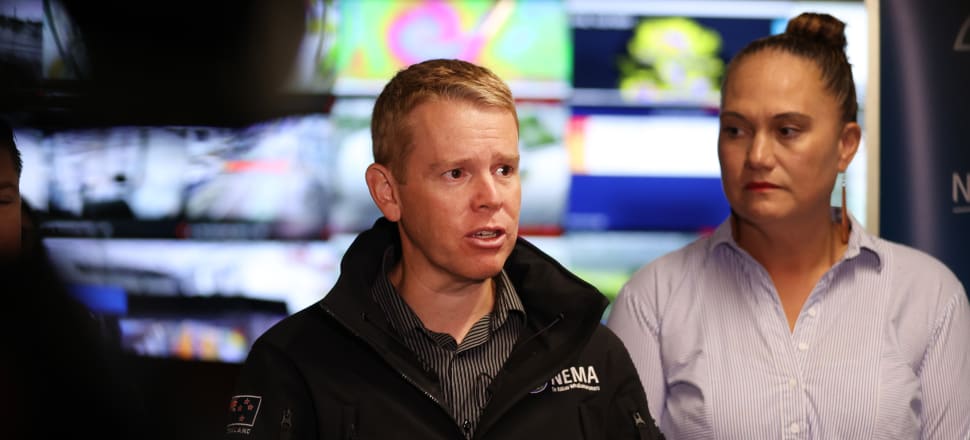
The worst of Cyclone Gabrielle was to pass overnight for much of the country, but some Kiwis face a long wait for the restoration of essential services as the Prime Minister urges caution and promises support
New Zealanders have been warned against complacency as the country battles its worst weather event this century, with Prime Minister Chris Hipkins saying there may be further damage even as Cyclone Gabrielle moves away from our shores.
The cyclone has forced roughly 2500 people from their homes, while roughly 225,000 are without electricity and have been told it could be days or weeks until the power is restored.
Hipkins said tens of thousands of emergency personnel and volunteers were working to help Kiwis affected by severe flooding and gale-force winds, after the Government earlier declared a national state of emergency for just the third time in Aotearoa’s history.
READ MORE: * Publicly-funded compensation for climate retreat * Gisborne: Can't even call 111
Speaking to media on Tuesday afternoon, having returned to Wellington from Auckland, Hipkins said the weather in most regions was forecast to improve overnight as the cyclone moved away from the country.
However, the Prime Minister said there would still be bad weather for some - particularly on the East Coast - while the compounding rainfall could have a delayed impact in some areas.
“When it comes to things like slips and so on, we could still see more of that even as the weather starts to ease, so we're still in for a bumpy time ahead.”
Emergency Management Minister Kieran McAnulty said there were around 2500 people currently estimated to have been displaced by the cyclone, including roughly 1000 in each of the Far North and Hawkes Bay.
McAnulty said the improving weather would allow authorities to get a better sense of the devastation caused by the storm, with the weather having cut off communications with some areas due to infrastructure damage and physical inaccessibility.
Officials were looking at what support they would need to provide to those facing long stints without power and water, with generators and chemical toilets among the potential solutions.
Kiwis without power could increase
Hipkins warned the number of Kiwis without power could increase overnight, with lines companies reporting levels of damage unseen since Cyclone Bola in 1988.
Telecommunications networks had been badly affected, with the sector’s emergency forum working with government officials to restore regional cell phone signals in the face of high winds and ongoing bad weather. Chorus had also notified authorities of a fibre internet cut affecting people from Taupō through to Napier, the Prime Minister said.
Auckland Airport had restarted domestic and international flights on Tuesday afternoon, but delays and disruption were likely for the next few days, while surface flooding and slips had caused damage to a large number of roads.
McAnulty said there were several rescue operations underway around the country. Rescuers had resumed the search for the firefighter caught in a Muriwai slip following a geotechnical assessment of the site, while RSE workers stranded by flooding in Hawke’s Bay were being taken to safety.
Hipkins said it was too early to place estimates on how much the cyclone response and recovery would cost, while it was likewise too soon to talk about any support packages for particular industries like farmers whose crops had been wiped out.
“I don’t think I have ever felt as sad or as angry about the lost decades that we spent arguing about whether climate change was real or not. We are standing in it right now. This is a climate change-related event." - James Shaw, Green Party co-leader
Responding to a ministerial statement on the emergency delivered by McAnulty at Parliament, several politicians focused on climate change’s role in the devastating scenes.
Green Party co-leader James Shaw blamed three decades of inaction on climate change for the ferocity of the storm, saying he was “struggl[ing] to find words to express what I am thinking or feeling about this particular crisis”.
“I don’t think I have ever felt as sad or as angry about the lost decades that we spent arguing about whether climate change was real or not. We are standing in it right now. This is a climate change-related event."
Te Pāti Māori co-leader Debbie Ngarewa-Packer argued the Government had to do more on climate change, saying a Minister for Auckland wasn't needed but a more comprehensive climate response was.
ACT Party MP Mark Cameron highlighted the impact of the storm on rural communities, saying he would likely have to hand-milk 300 cows at his Northland farm for the best part of a fortnight while power was restored.
"This is the kind of ongoing reality in rural New Zealand when these episodic events happen. Central areas around New Zealand - Northland, the East Coast, potentially without power for up to a week. Significant infrastructure - bridges gone, houses gone, people's lives destroyed."
Asked by media whether he regretted scrapping the biofuels mandate and extending a cut to petrol excise duty in light of the cyclone, Hipkins said he disagreed that those decisions amounted to weakening the country’s climate action.
“I've said all along that climate change remains a core area of focus for the Government and I think recent weather events have highlighted the importance of that.”
Parliament suspended
The Leader of the House, Grant Robertson, put out a statement following a meeting of the Business Committee at 12.30pm confirming Parliament would adjourn for the rest of the week following a short sitting on Tuesday.
Parliament will return next Tuesday where the Prime Minister's statement will be debated, followed by the first Question Time on Wednesday.
Hipkins was also scheduled to meet with Princess Anne at Government House in Wellington on Tuesday afternoon, but it was cancelled.







